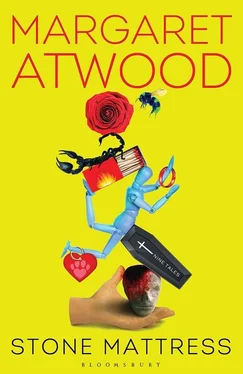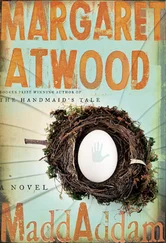Once up the gangway, she diddles around with her pack until everyone else has moved past the tag board, then flips Bob’s tag from red to green. And her own tag too, of course.
On the way to her cabin she waits till the corridor is clear, then slips through Bob’s unlocked door. The room key is on the dresser; she leaves it there. She hangs up the life jacket and Bob’s waterproof and baseball cap, runs some water in the sink, messes up a towel. Then she goes to her own cabin along the still-empty corridor, takes off her gloves, washes them, and hangs them up to dry. She’s broken a nail, worse luck, but she can repair that. She checks her face: a touch of sunburn, but nothing serious. For dinner, she dresses in pink and makes an effort to flirt with Bob the Second, who gamely returns her serves but is surely too decrepit to be a serious prospect. Just as well — her adrenaline level is plummeting. If there are northern lights, they’ve been told, there will be an announcement, but Verna doesn’t intend to get up for them.
So far she’s in the clear. All she has to do now is maintain the mirage of Bob, faithfully turning his tag from green to red, from red to green. He’ll move objects around in his cabin, wear different items from his beige-and-plaid wardrobe, sleep in his bed, take showers, leaving the towels on the floor. He will receive a first-name-only invitation to have dinner at a staff table, which will then quietly appear under the door of one of the other Bobs, and no one will spot the substitution. He will brush his teeth. He will adjust his alarm clock. He will send in laundry, without, however, filling out the slip: that would be too risky. The cleaning staff won’t care — a lot of older people forget to fill out their laundry slips.
The stromatolite will sit on the geological samples table and will be picked up and examined and discussed, acquiring many fingerprints. At the end of the trip it will be jettisoned. The Resolute II will travel for fourteen days; it will stop for shore visits eighteen times. It will sail past ice caps and sheer cliffs, and mountains of gold and copper and ebony black and silver grey; it will glide through pack ice; it will anchor off long, implacable beaches and explore fjords gouged by glaciers over millions of years. In the midst of such rigorous and demanding splendour, who will remember Bob?
There will be a moment of truth at the end of the voyage, when Bob will not appear to pay his bill and pick up his passport; nor will he pack his bags. There will be a flurry of concern, followed by a staff meeting — behind closed doors, so as not to alarm the passengers. Ultimately, there will be a news item: Bob, tragically, must have fallen off the ship on the last night of the voyage while leaning over to get a better camera angle on the northern lights. No other explanation is possible.
Meanwhile, the passengers will have scattered to the winds, Verna among them. If, that is, she pulls it off. Will she or won’t she? She ought to care more about that — she ought to find it an exciting challenge — but right now she just feels tired and somewhat empty.
Though at peace, though safe. Calm of mind all passion spent, as her third husband used to say so annoyingly after his Viagra sessions. Those Victorians always coupled sex with death. Who was that poet anyway? Keats? Tennyson? Her memory isn’t what it was. But the details will come back to her later.
• • • • • • • • •
The little people are climbing up the nightstand. Today they’re wearing green: the women in pannier overskirts, broad-brimmed velvet hats, and square-cut bodices shimmering with beads, the men in satin knickerbockers and buckled shoes, with bunches of ribbons fluttering from their shoulders and outsized bird plumes decorating their tri-corns. They have no respect for historical accuracy, these people. It’s as if some bored theatrical costume designer got drunk behind the scenes and raided the storage boxes: an early Tudor neckline here, a gondolier’s jacket there, a Harlequin outfit over there. Wilma has to admire the splapdash abandon.
Up they come, hand over hand. Once level with her eyes, they link arms and dance, gracefully enough considering the obstacles in their way: the night light, the jeweller’s loupe sent by her daughter Alyson — a kind gesture but not very helpful — the e-reader that magnifies type. Gone with the Wind is the book she’s struggling with at the moment. She’s lucky if she can grope her way through a single page in fifteen minutes, though happily she can remember the main parts from the first time she read it. Maybe that’s where the green fabrics on the tiny folk have come from: those famous velvet curtains that headstrong Scarlett sewed into a gown to disguise herself as respectable.
The little people twirl about, the skirts of the women billowing. They’re in a good mood today: they nod at one another, they smile, they open and close their mouths as if they’re speaking.
Wilma’s fully aware that these apparitions aren’t real. They’re only symptoms: Charles Bonnet’s syndrome, common enough at her age, especially in those with eye problems. She’s fortunate, because her manifestations — her Chuckies, as Dr. Prasad calls them — are mostly benign. Only rarely do these people scowl, or swell out of proportion, or dissolve into fragments. Even when they’re angry or sullen, their fits of ill temper surely can’t have anything to do with her, since the little folk never acknowledge her; which is also — says the doctor — par for the course.
She likes the miniature Chuckies, much of the time; she wishes they would talk to her. Be careful what you wish for, said Tobias when she shared this thought with him. Number one, once they start talking they might never shut up, and number two, who knows what they’d say? He then launched into an account of one of his past affairs; long past, needless to say. The woman was ravishing, with the breasts of an Indian goddess and the marble thighs of a Greek statue — Tobias is given to archaic, overblown comparisons — but every time she opened her mouth such banalities would emerge that he would almost burst with repressed irritation. It was a protracted and stressful campaign to get her into bed: chocolates were involved, in a heart-shaped golden box, the very best quality, no expense spared. Also champagne; but this had not made her more willing, only more fatuous.
According to Tobias, it was more difficult to seduce a stupid woman than an intelligent one because stupid women could not understand innuendo or even connect cause with effect. The fact that a pricey dinner ought to be followed, as the night the day, by the compliant opening of their peerless legs was lost on them. Wilma has not considered it tactful to suggest to him that the blank stares and cluelessness might well have been acting on the part of these beauties, who would not be averse to a free meal if all it cost them was a widening of their huge, dumb, heavily fringed eyes. She remembers confidences exchanged in ladies’ powder rooms, back when they were called “powder rooms”; she remembers conspiratorial tittering, she remembers helpful how-to hints exchanged concerning the gullibility of men, in between the lipsticking of mouths and the pencilling of eyebrows. But why upset suave Tobias by revealing all this? It’s too late for such inside information to be of practical use to him, and it would only tarnish his rose-tinted memories.
“I should have known you back then,” Tobias says to Wilma during his chocolates-and-champagne recitals. “What sparks we would have struck!” Wilma parses this in silence: is he saying that she’s intelligent, and therefore a quick lay? Or would have been then. Does he realize that a more easily offended woman might take this as an insult?
Читать дальше












